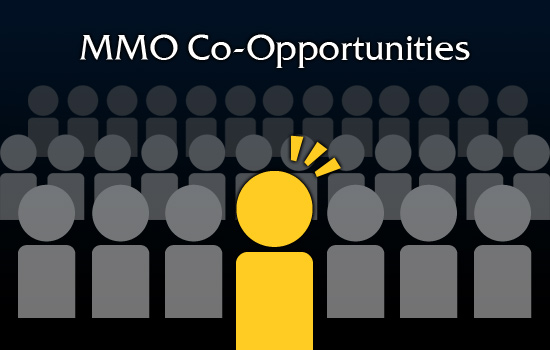
Since this is our first issue of MMO Co-Opportunities of the year, I thought we could look at the MMOs that are on the rise for this year. As a member of the MMO community for the past eight years or so, I’ve seen years that have provided a veritable bounty of MMOs, years where the pickings have been paltry, years that have contained huge disappointments, and years that have contained an MMO or two which pleasantly surprised me. For me, at least, 2010 was a slow year for MMOs. Cataclysm dropped at the end of the year, which is fantastic to all the WoW players out there, but for many of us who don’t play WoW, we look ahead in anticipation to what the next year holds. 2011 looks to be a year when a lot of highly-anticipated MMOs will launch. My list is, of course, not exhaustive, but I wanted to highlight some of the heavy hitters that are on the table for this year.

DC Universe Online (DCUO)
Release Date: Jan 11, 2011
DCUO takes place in the world of DC comics, complete with many of the fan-favorite heroes and villains. The story goes that Lex Luthor and a bunch of other villains managed to kill off Superman, Wonder Woman, and Batman amongst other superheroes only to crushed by Brainiac shortly thereafter. To avoid a terrible future, Lex Luthor goes back in time to warn the heroes of this grim future as well as unleashing microbes that will grant normal humans superpowers. This is where you come in. You can design either a super hero or villain to join the fight. Both sides are trying to combat the failed future, but their means are different. You can pick to follow Wonder Woman, Superman, or Batman on the hero side or Circe, Lex Luthor, or the Joker on the villain side. You can also choose a weapon (e.g. one-handed weapon, bow, staff) and a power set (e.g. nature, fire, ice). It is also bleeds traditional MMO gameplay with action game gameplay (e.g. there are combo systems).
Potential Co-opportunity: From what I can tell, immersion are going to be one of the really big draws for this game. I’ve never really been into comics, but from what I’ve heard DCUO takes you to a lot of important places from the various comics that will make any fanboy squeal with glee. Another factor of note is their interesting role system. Each of the power sets has a damage stance so all characters can easily dish out the damage, but each power set has one of three other possibilities for more intense group play. For example, the fire power set can settle into a tank role and the nature power set can settle into a healer role.
.jpg)
RIFT
Release Date: 2011
Another faction-based game, RIFT has players pick a side: the spiritual Guardians or the technology-driven Defiant. Story-wise, both Guardians and Defiant are trying to prevent the destruction of the world (weird how a lot of MMOs are going this way, isn’t it?), and both blame the other side for all the bad that’s happened. Whichever side you pick, you start off as a recently slain hero who has been resurrected to get back into the fight (for the Guardians, you’ve been resurrected by a god, for the Defiant, you’ve been resurrected by Defiant-created machines). Unlike most MMOs, RIFT does not feature a traditional class system, which is the biggest potential co-opportunity I wanted to address.
Potential Co-opportunity: When you create your character in RIFT you can choose one of four major archetypes (or Callings, as they call them): Warrior, Rogue, Cleric, and Mage. This archetype controls what armor type you can wear and what basic mechanic you’ll be using. Most importantly, though, it determines what Souls you have access to. Souls are kind of like classes of the traditional MMO. Each archetype has 8 different Souls, for a total of 32 Souls. Once you have them unlocked, you can have up to 3 Souls equipped at a time. The Soul Trees are similar to the Talent trees you may see in a lot of MMOs, like WoW. The biggest difference, however, is that whichever Souls you have equipped completely determine what skills you have. As you level up, you are granted points to spend in the “Branches” of a Soul Tree. By doing this, you are first customizing your character (e.g. when you first start spending points in a Soul tree, you may be faced with a choice of armor % or attack rating %) and you are automatically unlocking different skills in the “Roots” of the tree. It’s somewhat a build-your-own-class system. Say you like the Ranger’s pets, but you want some more ranged skills so you throw in some Marksman. Then perhaps you like some of the buffs Bards have. You can throw together a Ranger/Marksman/Bard class. Better yet, you can unlock Roles (up to 4) which allow you to make additional combinations, then swap between them whenever you want to (so long as you are not in combat). Say you’re playing a Cleric archetype and your friends need you to heal. No problem, switch to a healing role. Another friend gets on who really likes to heal, so you add them to your party and switch back to a damaging role. A little while later your tank has to split, but no problem, Clerics have access to a tanking Soul, too (Justicar), so you switch to that. This system is something that I’m very excited about, because often one is faced with the choice of going for the ideal group comp, or play with more friends regardless of group comp (or make decisions about who gets to play what based around this idealized group comp); this system makes it so you don’t have to do that. People who like to focus on support characters while grouping don’t have to struggle when they’re playing by themselves: they can set up a grouping role and a solo role.